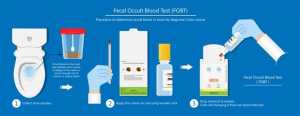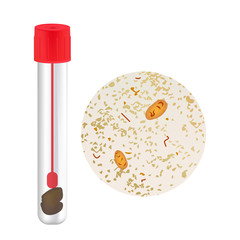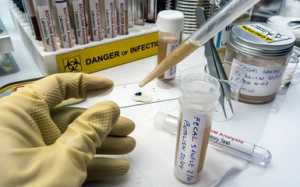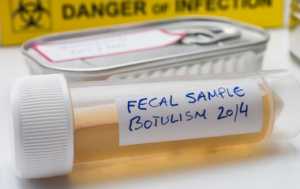Stool Test- Types, Purpose, Procedure and Result Interpretation
A stool test is also known as stool culture, faecal sample test or stool sample test. The test helps in diagnosing medical conditions, such as inflammatory bowel disease, gastric or colon cancer, anal fissures, haemorrhoids, as well as to detect the presence of blood in your stool sample.
Stool tests helps to determine whether a bacteria or any other microorganism has infected the intestines or not. But not all microorganisms in the gut are harmful- some are necessary for normal digestion. If harmful bacteria or parasites infect your intestines, they cause bloody diarrhoea and testing the stool may help find the cause of this condition.

Types of Stool Tests
Ova and Parasites Test
Your doctor may order an ova and parasites test to check parasites or ova(egg) in your stool sample. The test is usually ordered if you’re experiencing symptoms associated with an intestinal infection like:
- Presence of blood or mucus in your stool
- Frequent diarrhoea
- Fever
- Acute abdominal pain
- Headache
- Vomiting or nausea
You need to collect stool samples at home, using latex gloves and plastic wrap. The plastic wrap should be covered in the toilet before using it. The sample should not contain urine or toilet water. After collecting the sample in a container, it should be returned to the lab right away, for getting accurate results.
Positive results may indicate that there is a presence of parasites and ova in your stool sample. Bacteria in the stool that may cause an infection are:
- Entamoeba histolytica
- Giardia
- Cryptosporidium
The test may also detect:
- Dientamoeba fragilis
- Balantidium coli
- Cyclospora cayetanensis
- Roundworms
- Flatworms
- Hookworms
- tapeworms
White Blood Cell Test

This test is often used to detect leukocytes or White Blood Cells in your stool sample. White blood cells(WBC) help your body fight off infections, and it’s usually a part of our immune system. Leukocytes in the stool may indicate a bacterial infection or an Inflammatory bowel disease- a condition characterised by inflammation in the digestive system. Your doctor may order this test if you experience any of the symptoms such as:
- Mucus or blood in the stool
- Watery diarrhoea that lasts for more than four days
- Fever
- Abdominal pain
- Fatigue
The healthcare provider will provide you with a special container to collect your stool sample. Make sure that there is no urine, toilet paper or water in your stool sample. After collecting the sample, seal it, and return it to the healthcare provider.
If your white blood cell test results are negative, then it indicates that there are no leukocytes present in your stool sample. The symptoms that you have experienced may not be caused by an infection.
If your results are positive, then it indicates the presence of leukocytes in your stool sample. There may be some kind of inflammation inside your digestive tract. If there are more leukocytes in the sample, it means you have a higher chance for a bacterial infection.
H.Pylori Antigen Test

H.Pylori or Helicobacter pylori is a bacteria that infects your digestive system. Some people may never have any symptoms of infection, even though these bacteria infect them. But for others, H.Pylori may cause gastrointestinal disorders such as
- Peptic ulcers( a condition characterised by sores in the oesophagus, small intestine or stomach)
- Gastritis(inflammation of the stomach)
- Or certain types of stomach cancer
The test is often used to
- Detect H.Pylori inside your digestive tract
- Check whether the digestive symptoms are caused by an infection.
- Determine whether the treatment for H.Pylori infection is working or not.
Your doctor may order this test, if you’re experiencing symptoms that indicate a peptic ulcer, such as
- Abdominal pain
- Nausea
- Indigestion
- Frequent vomiting
- Bloated feeling
Collect the stool in the special container provided to you by the healthcare provider and return it, making sure that there is no presence of urine, toilet water or toilet paper in the sample. A small amount of stool sample is placed in vials and colour developer, and chemicals are added to it. If the sample turns blue in colour, then it is a sign of H.Pylori in your stool.
Faecal Occult Blood Test
This test helps in checking hidden or occult blood in a sample of your stool. If there is small amount of blood in your stool, it may indicate bleeding in your digestive tract, due to conditions like
- Ulcers
- Polyps(non-cancerous tissue growth on your mucous membrane)
- Diverticulosis( a medical condition in which small pouches develop in the digestive tract)
- Colitis(inflammation or swelling of the colon)
- Haemorrhoids (a condition characterised by swollen blood vessels around your anus or rectum)
- Colorectal cancer
If you’re tested positive for any of the types of a faecal occult blood test, it can be a sign that you have bleeding in your digestive tract. But this doesn’t necessarily indicate that you have cancer. A positive faecal occult blood test also shows polyps, haemorrhoids, ulcers, or benign tumours.
Stool DNA test

This type of stool test detects abnormal DNA, that occur normally because of colon polyps or colon cancer as well as traces of occult blood, in your stool sample. A stool DNA test is a screening test for colon cancer and precancerous polyps for people who are not experiencing any signs and symptoms associated with it. If there are polyps or cancer in your colon, they may shed cells having abnormal DNA into your stool.
During this test, you need to collect your stool sample, similar to other stool tests and submit it to your healthcare provider.
Your test is considered positive if there are abnormal DNA changes associated with polyps or colon cancer or traces of occult blood in your sample. Your test is considered negative if there are no abnormal DNA changes associated with polyps or colon cancer or traces of occult blood in your sample.
You need to take an additional test, such as colonoscopy to diagnose polyps or cancer inside your colon. For those who take a stool DNA test, only a few get positive results, but no polyps or cancer are detected during colonoscopy. In such cases, further testing is normally not recommended.
Frequently Asked Questions
What happens during a faecal occult blood test?
There are two different types of a faecal occult blood test- immunochemical method and guaiac smear method. For both the tests, you need to collect three separate stool samples. You need to smear a small amount of stool in the test card provided by your healthcare provider. You have to label and seal all the stool samples and return it to your healthcare provider.
What is the common treatment for peptic ulcer caused by H.Pylori Bacteria?
Usually, the treatment involves a combination of certain drugs and antibiotics, such as histamine receptor blockers, proton pump inhibitors and Pepto Bismol, generally taken for several weeks, which reduces the amount of stomach acid produced in your stomach.
What happens during a Stool DNA test?
The healthcare provider will provide you with a stool DNA test kit to collect and submit the sample. The test kit includes a container and a preservative solution. You need to attach the container to the toilet and add the solution to the stool sample before returning it to the lab. Unlike the faecal occult blood test, you need to collect and submit only one sample.
What does the positive and negative result indicate in an H.Pylori antigen test?
A positive H.Pylori test indicates that the symptoms that you have experienced were due to peptic ulcer caused by H.Pylori bacteria. A negative H.Pylori test indicates that the symptoms that you have experienced were caused due to other reasons, and it’s less likely that you have an H.Pylori infection.
Do I need to prepare for the faecal occult blood test?
Certain medications and foods may affect your guaiac smear method results. Your doctor may ask you to avoid Non-steroidal Anti-inflammatory drugs, such as aspirin, ibuprofen or naproxen one week before the test. You may also be asked to avoid taking Vitamin C(more than 250mg) per day, from fruits, fruit juices or supplements for one week before the test as well as red meat, including pork, beef and lamb three days before the test.